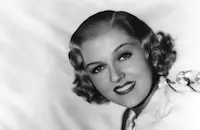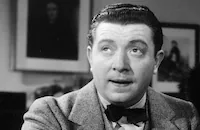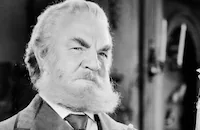Elmer the Great

Brief Synopsis
Cast & Crew
Mervyn Leroy
Joe E. Brown
Patricia Ellis
Frank Mchugh
Claire Dodd
Preston S. Foster
Film Details
Technical Specs

Synopsis
In Gentryville, Indiana, Elmer Kane is well-known as a home run hitting baseball player. Bull McWade, representing the Chicago Cubs, the new owners of Elmer's contract, arrives in town to bring Elmer to Chicago, but he refuses to go because he doesn't want to be separated from Nellie Poole, his boss and the woman he loves. After she pretends that she doesn't love him, however, he signs the contract. Although the other players on the team think of Elmer as a hick and tease him unmercifully, he wins their respect when they see him hit. The team makes it to the World Series, and everything looks good until Elmer starts to gamble. Naive Elmer thinks the gambling chips are free, and by the time he finds out the truth, he is $5,000 in debt. The gangsters who run the club have bet on the Series, so they agree to rip up the I.O.U. if Elmer throws the game. This makes Elmer mad and he lands in jail, where Nellie finds him and pays his bail. Still thinking that Nellie doesn't love him, Elmer agrees to throw the game in order to return the bail money to her, but changes his mind when she reveals her true feelings. Furious, the gangsters try to convince the team's owners that Elmer shouldn't play, but finally everything is straightened out, and Elmer hits the winning home run. Elmer, the hero, is asked to talk on the radio, and he proposes to Nellie on the air.

Director

Mervyn Leroy
Cast

Joe E. Brown

Patricia Ellis

Frank Mchugh

Claire Dodd

Preston S. Foster

Russell Hopton

Sterling Holloway
Emma Dunn
Charles Wilson
Charles Delaney

Berton Churchill

J. Carroll Naish
Gene Morgan

Jessie Ralph

Douglass Dumbrille
Crew

Videos
Movie Clip



Trailer
Hosted Intro
Film Details
Technical Specs

Articles
Elmer the Great
The Ring Lardner-George M. Cohan stage comedy starred Walter Huston in its original Broadway run, and Brown actually headlined a 1931 revival. (Moreover, the story had actually already been filmed once before as Fast Company (1929), with Jack Oakie in the lead.) So Joe was more than ready to step into the cleats of Elmer Kane, country-boy outfielder with an ego proportionate to his considerable home-run power, whom the Chicago Cubs pluck from the sticks in the hope that he can lock up their long-sought World Series berth and eventual championship. (Boy, the more things change...)
Between his frustrated affections for a hometown girl (Patricia Ellis), the conniving of various gamblers and fixers, and some improbable gamesmanship on the part of the Yankees during the Fall Classic, Elmer's got his hands full until the final fade-out. While Elmer had been an ace pitcher in previous incarnations of the story, the film was produced at the career height of the legendarily gifted, and just as legendarily cocky "Dizzy" Dean, pitcher for the St. Louis Cardinals, and the studio might have been uncomfortable with the coincidental similarity.
In his 1959 autobiography Laughter Is a Wonderful Thing, the baseball-savvy Brown acknowledged Chicago White Sox pitcher Ed Walsh as having inspired Lardner's Elmer, and declared that he drew his own characterization from Philadelphia Phillies hurler Harry Coveleskie. "Coveleskie came from some mining town in Pennsylvania and he was what you might call unlettered," the comedian recalled. "He was a pretty good pitcher. He had a lunk walk and was funny to watch."
The direction was capably handled by Mervyn LeRoy, who was behind the camera for three other Brown vehicles (Top Speed (1930); Broadminded (1931); Local Boy Makes Good (1931)) and remembered the comedian fondly in his 1974 autobiography Take One. One incident concerned Mike J. Frankovich, later a front office executive and producer for Columbia, then just a UCLA student who Brown and his wife had taken into their home as an adopted son. "I did give him one line, though, to please Joe," the filmmaker wrote. "It was a simple line: 'Good morning, Elmer. Have you had your breakfast yet?' A simple line, but poor Mike was so nervous it took us a dozen takes to get it right. Whenever I see Mike these days, I kid him about that line and he kids me back."
Director: Mervyn LeRoy
Screenplay: Thomas J. Geraghty; Ring Lardner, George M. Cohan (play)
Cinematography: Arthur Todd
Art Direction: Robert M. Haas
Film Editing: Thomas Pratt
Cast: Joe E. Brown (Elmer Kane), Patricia Ellis (Nellie Poole), Frank McHugh (Healy High-Hips), Claire Dodd (Evelyn Corey), Preston S. Foster (Dave Walker), Russell Hopton (Whitey), Sterling Halloway (Nick Kane), Emma Dunn (Mrs. Kane), Charles Wilson (Mr. Wade), Charles Delaney (Johnny Abbott), Berton Churchill (Colonel Moffitt), J. Carroll Naish (Jerry), Gene Morgan (Noonan).
BW-73m. Closed captioning.
by Jay S. Steinberg

Elmer the Great
Quotes
Trivia
Notes
Contemporary sources note that Joe E. Brown had been a professional baseball player before becoming an actor. The film was shot over 30 days for a total budget of $200,000. Paramount filmed the play as Fast Company as a talkie starring Jack Oakie and directed by A. Edward Sutherland (see AFI Catalog of Feature Films, 1921-30; F2.1655). Warner Bros. filmed the play again in 1939 as Cowboy Quarterback.
















